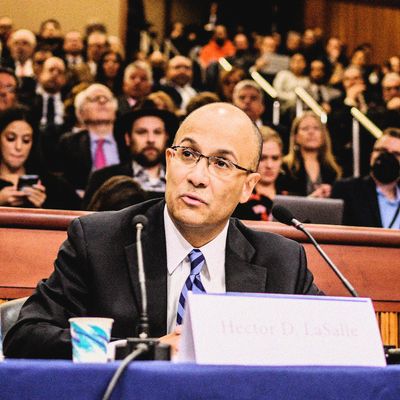
The term overreach in politics is shorthand for when leaders aren’t exactly drunk with power but are clearly getting a little bit tipsy. That is the dynamic among progressive Democrats in Albany these days, especially in the State Senate, which is why New York still does not have a chief judge.
You may recall last month’s power play in which Senate leaders stacked the Judiciary Committee with members who’d already announced they would vote against Governor Hochul’s nominee, Hector LaSalle, for chief judge. Moments after the committee voted against LaSalle’s confirmation, the committee’s chairman, Senator Brad Hoylman-Sigal — ignoring Republicans requesting that the matter be forwarded to the full Senate — slammed down the gavel and declared the hearing adjourned.
Hoylman-Sigal later declared the matter closed: “The nominee was rejected, and the full Senate has, as a result, spoken.”
Not so fast.
“We are absolutely in unchartered territories,” Governor Hochul told me. “I read the Constitution very clearly. It says that the governor names an individual to lead the courts with the advice and consent of the Senate. The word ‘senate’ is very clear to me.” The Constitution, she argued, requires the full body of 63 senators, not a handpicked committee, to cast a vote.
Senator Anthony Palumbo, the ranking Republican on the Judiciary Committee, has filed a lawsuit asking the state’s highest court to issue a ruling that will clarify the matter.
“Since the current version of Article VI [of the Constitution] was adopted more than forty-five years ago, the Senate has held a floor vote to confirm or reject every single nomination made by a governor, regardless of whether the Senate was controlled by the same party to which the governor belonged,” the lawsuit reads.
Palumbo also warns about the manipulation of the committee that led to LaSalle’s rejection. “If the Judiciary Committee was reduced in size by the majority leader with a vote of the caucus to only three members, two senators would effectively control who becomes chief judge by the simple expedient of not letting the nomination get to the floor,” says the lawsuit. “Further, it would insulate individual senators from any public scrutiny that a full floor vote provides, reducing the process to a small number of senators controlling the outcome. This is the polar opposite of what the Constitution requires.”
Palumbo, who says he did not contact or coordinate with Hochul before filing the lawsuit, is seeking something analogous to what happened in 2013, when Republicans controlled the Senate and Democratic governor Andrew Cuomo nominated a left-leaning law professor, Jenny Rivera, to the Court of Appeals. Republicans cast a committee vote expressing non-approval of Rivera for the court — but then forwarded the nomination to the full Senate, which confirmed her.
Senator Andrea Stewart-Cousins, the Majority Leader of the Senate, rejecting a repeat of the Rivera scenario, issued a forceful statement defending her control of the process. “This ongoing attack makes it clear that there are those that don’t accept the Senate’s role in this process, and will not be happy unless we simply act as a rubber stamp. This is a dangerous infringement of the separation of powers,” she said.
The matter should soon be straightened out by the Court of Appeals. “I have every confidence, just as has been done in the past when for one reason or another there was controversy, that nomination goes to the floor,” says Jonathan Lippman, a former chief judge.
Even if LaSalle’s nomination goes to the full Senate, he might well lose on the floor; Stewart-Cousins told me last month that LaSalle didn’t have enough votes to win approval. But the larger point — how much control the Senate has over the process — is important.
“This is a very big deal,” former governor George Pataki told the New York Post. “It’s a question of who we have running the state — the governor or radical leftists in the legislature.” Ex-governor David Paterson agrees that Hochul needs to fight. “It’s not a political process. It’s a constitutional one,” he said on WABC radio. “The Democrats unfortunately cannot cite any reason why LaSalle’s nomination didn’t go to the full Senate, especially since the language mirrors that of the United States Constitution.”
But politicians who are riding high and feeling the electric charge of raw power do not need to cite reasons, follow precedent, or give coherent explanations. Instead, they stack committees, slam down gavels, and simply cut the conversation short when asked whether a bit of compromise or restraint might be in order.
Last year, Senate Dems, feeling the buzz, drew district lines so outrageously gerrymandered that a judge, backed by the Court of Appeals, imposed new lines that cost Democrats several seats in Congress. Having apparently learned nothing from that fiasco, top Senate Dems now seem prepared to double down and try to seize control of the top court itself. It seems that those gulping down the intoxicating brew of power never know when to say when and instead simply reach — overreach — for just a bit more.






























